Come join us now, and enjoy playing your beloved music and browse through great scores of every level and styles!
Can’t find the songbook you’re looking for? Please, email us at: sheetmusiclibrarypdf@gmail.com We’d like to help you!
Bill Evans Trio – What Is This Thing Called Love? A Musical analysis (with sheet music)
Bill Evans
Bill Evans was born on August 16, 1929 in New Jersey and died on September 15, 1980.
According to Piano Red in his blog (2012) at the age of 6 he began his studies of classical piano musicals at College Southeastern Louisiana and in 1950 obtained his bachelor’s degree of piano performer and teacher, with a completely classical repertoire, with works by great composers such as Bach, Brahms, Chopin, Kavalevsky and Beethoven.
Piano Red on his blog (http://www.pianored.com/bill-evans.html) mentions: Evans does not he was only a pianist, he also studied flute and violin. He also studied composition at the Mannes College of Music in New York.
In 1956, the first Evans album was released and was titled ‘New Conceptions of Jazz’ and that is how his most beloved and recognized saw the light composition “Waltz for Debby”.
Because of his improvisational way, ideas and unique sound, he gradually became recognized within the jazz scene in the great city of New York. It is reported that it was not until 1958 that Miles Davis proposed to join his group, where the renowned musicians were also Cannonball Adderley and John Coltrane; together with this great staff they recorded in 1959 the album “Kind Of Blue” and remains with them for almost a year traveling and recording.
The job performed together with Miles and everything learned helped this great pianist to strengthen his
reputation of his and in 1959 Bill founded his innovative trio with an incredible staff in which he is Scott LaFaro on bass and with Paul Motian on drums. With this trio they make two albums of studio, in addition to the highly regarded live sessions at the Village Vanguard in New York, in the year 1961.
In the year 1963, his album ‘Conversations With Myself’ was released, thus earning him his first Grammy. A year later, he toured abroad, playing in cities like Paris and Tokio.
With the passage of time, Evans’ reputation grew, and he began to play in the most acclaimed clubs. In the 1970s he did hard work and recorded extensively various projects such as trios, solo piano, some quintets under his own name.
In 1978, he forms what will be his last joint trio of him with Marc Johnson on bass and Joe LaBarbera on the drums.
However, not everything was rosy in the personal life of Bill Evans since his childhood he lived in a chaotic home reigned by excessive alcohol on the part of his father, which led him to lack stability in his personal life. Bill Evans in his adulthood he had family problems and disorders in his life, mostly the main cause was addiction to narcotics.
However, this was not an impediment to continuing with the music, and he continued working even though his health was gradually deteriorating.
In the 1970s, Evans turned away from heroin, which was not an efficient outlet since he became addicted to cocaine. It was not long after that, on September 15, 1980, he was taken to the Mount Sinai Hospital and there he would pass away due to a bleeding ulcer, cirrhosis of the liver, pneumonia and chronic hepatitis.
Outside the musical aspect, Bill Evans was a lover of reading, philosophy, having a library full of great philosophers of that area. He was very attracted to painting and drawing.
A music critic qualified it and pointed out as follows: “Over time, Bill Evans has become a whole school for pianists” (Richard S. Ginell, s.f.).
There is no doubt that knowing the history of this great pianist makes us appreciate and understand in a better way how it is that Bill Evans, with a training early in classical music, made jazz an innovative world.
Best Sheet Music download from our Library.
What Is This Thing Called Love? Melody analysis
Chromatic scale.
A chromatic scale is the succession of twelve different notes within a single eighth. Ascending and descending by semitones. However, when ascending they use sharps and when descending they use flats, as in the following example.


In general, this is a very used melodic and harmonic resource in jazz. However, the sound of Bill Evans in most of his solos is present in the chromatic scale. This may or may not be in complete order.
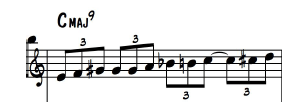

Chromatic Approximations.
A chromatic approximation is usually not diatonic to the key being played, exerting on the musical theme and moves by semitones towards a target note (Pease &
Freeman, 1989).
Bill Evans usually always made these kinds of approximations, but the target note always rests on a figure of long value, in this case on a quarter note, which gives a total feeling of stability.
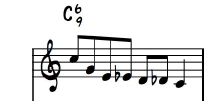
In the previous figure, it should be noted that sometimes the approximation can also solve a tension, in this case the 13th.


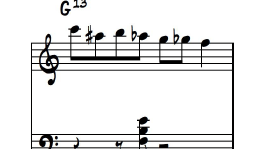
Arpeggios.
First, we must define it. According to Latham (2008): ‘An arpeggio is when the notes of a chord are played successively either ascending or descending, instead of being
executed simultaneously’. (p.113)

Within Bill Evans’ improvisation, we find arpeggios, but sometimes he makes them from his root and other times from one of his possible inversions. Most of the time, the rhythm that these arpeggios are played are in eighth note triplets or black triplets or in turn triplets where these two figures are mixed.
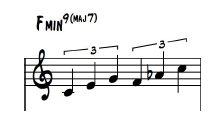
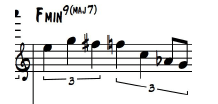
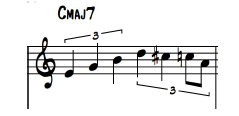

Half-Whole/Whole-Half scale.
This type of scales, also called symmetric scales or “combination diminished”, are scales that move by “semitone – tone” or “tone – semitone”.
Bill Evans makes use of these scales when he has dominant chords with tensions like T9 (please, watch the below images).
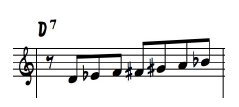

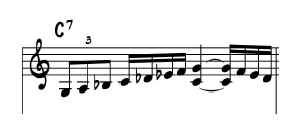
Harmony
Quartal chords.
A quartal chord is one that in its structure is formed by intervals of a fourth, sometimes there is an interval of a third. These kinds of chords do clearly denote Bill Evans’ classical initial musical training on the piano.
Can we take as an example Erik Satie, a French composer belonging to the period of the Vanguardism and the genre of ‘Classical Music’, who in his work ‘Les Files Des Étoiles’ makes use of quartal chords and a tritone which provokes a feeling like that of an announcement or revelation?

satie
It is very relevant to take this example into account, since this type of composers, Evans studied at the time of his classical training and, however, some time later this guy
of harmonies was reflected in his improvisation, being very clear that he had an interest very great for joining classical musical practices with contemporary jazz.
This type of chords are very characteristic within the improvisation of Bill Evans, which provokes a totally new, innovative, tense and modal sound.
Another improvisational characteristic of Bill Evans is that when playing the quartal chords does it with a rhythm only in eighth notes, this topic will be treated in a better way in the last analysis.

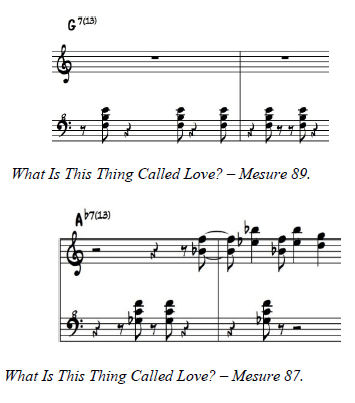
Clusters.
Before dealing with this scope, we will proceed to define it.
Clusters are voices in which the predominant interval between the adjacent notes is of a second. This widely spaced voice creates an effect thick and dissonant. The voices that contain all the seconds create the level of maximum density.
As other intervals are included, the voice opens and the density decreases. Because a smaller second interval is more
dissonant than one of the major second, voices that contain at least one minor second will have more “bite” than those containing only second greater. (Pease & Pulling, 2001, p. 93)
Bill Evans uses the clusters in the left hand always as comping6 in block while the right hand is improvising. Again this type of voicing Evans using them, he creates a totally enriching, modal and innovative atmosphere in a sound and theoretical context within the jazz.
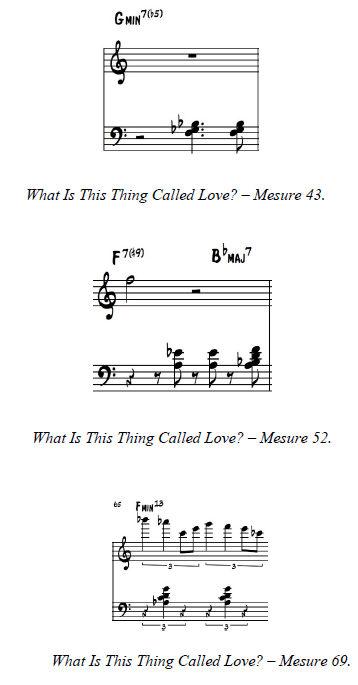
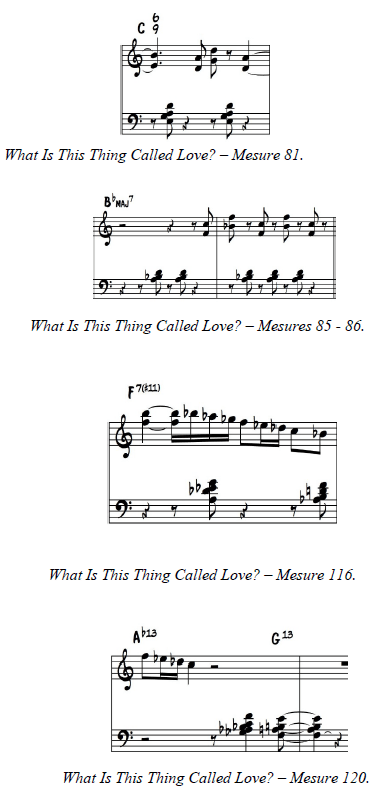
Rhythmic
In this last section of the analysis of the solo, What Is This Thing Called Love?, presents that Bill Evans’ comping was not rhythmic enough, unlike other greats
contemporary pianists of his time, such as Wynton Kelly, who had a high sense of the groove.
In this solo the comping is quite limited, mostly eighth notes, which per bar he will play them at least twice. Evans notes that he emphasized giving more “Color” to the notes with the different tensions, of which he used the most b9, # 9, b13, which gives a modal character.
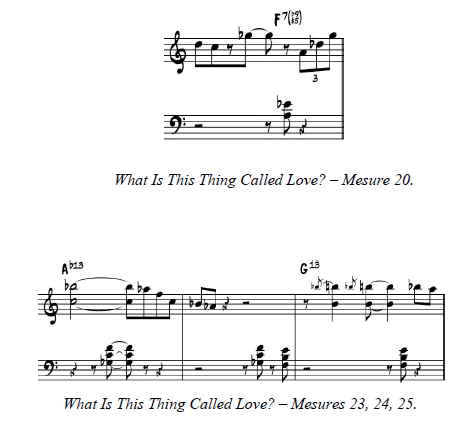
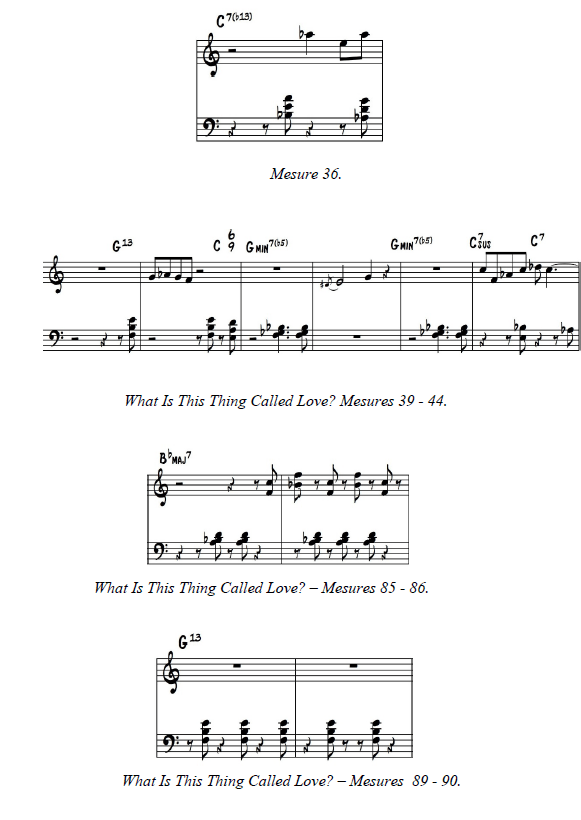
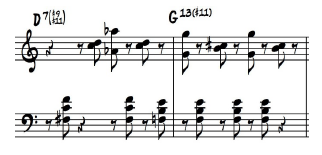
Browse in the Library:
Or browse in the categories menus & download the Library Catalog PDF:
Black and Eighth note triplets.
First we proceed to the definition of these figures. The division of a figure without a dot into three equal parts receives the triplet name. The notation of this is made with a number three aligned with the central figure. If the triplet is applied to three crotchet figures that group them (Ottman & Mainous, 1979, p.122-123).
These figures are very typical of Bill Evans within his improvisation, he is one of the characteristic features of him when differentiating his improvisational interpretation from other pianists.
Usually these triplets in the melodic aspect are being played with arpeggios; They do not have a specific direction since it varies, that is, they go ascending or descending, what makes the difference is the color with which they are played, sometimes with arpeggios as already mentioned before or with chromatic approximations.

In the above figure, it can be clearly seen how Evans not only uses one type of triplet, but it mixes them as in measure 14 which plays them in a semi-strong beat of the compass. In general, this type of triplets (mixed quarter note and eighth note) is interpreted in semi-strong or weak beats of the measure.
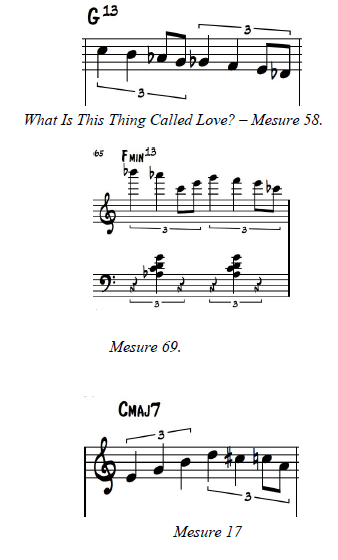
Now, in the following examples that are detailed, use the eighth note triplets and to their time also moves chromatically towards target notes of the chord.
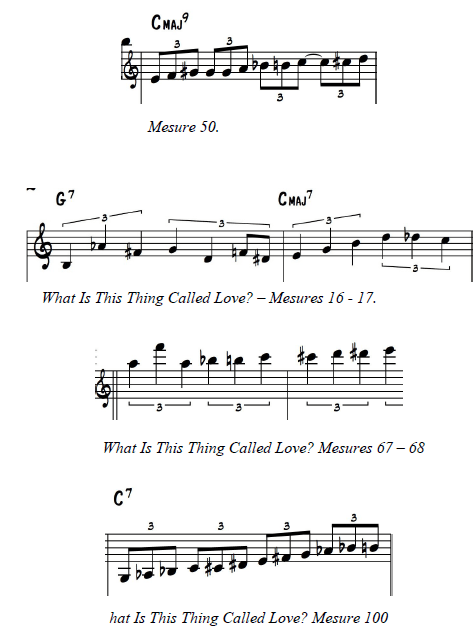


Bill Evans’ improvisation is marked by originality, sonority and, above all, all the intention that in a certain way with it wants to reach or transmit a message of a search for something constant and innovative.
The theme that has been analyzed was recorded at the time
that Bill Evans was at the height of his musical career and where his knowledge acquired along with Miles and many other outstanding Jazz musicians were ‘fresh’, for
what is the songs of the album ‘Portrait in Jazz’ of 1960, makes them look clearly like maintains throughout the record material, all these characteristic features.
So, it is evident how it is that in its entirety the sound and features characteristics of Bill Evans were greatly influenced by classical music, the which was the gateway for him in the musical field. It is very clear to realize only with listen to him and as his improvisational development is very academic, however, his taste for knowing how to combine this genre and jazz make his interpretation something new, worthy of being named a new way of improvising.
Please, subscribe to our Library.
If you are already a subscriber, please, check our NEW SCORES’ page every month for new sheet music. THANK YOU!
